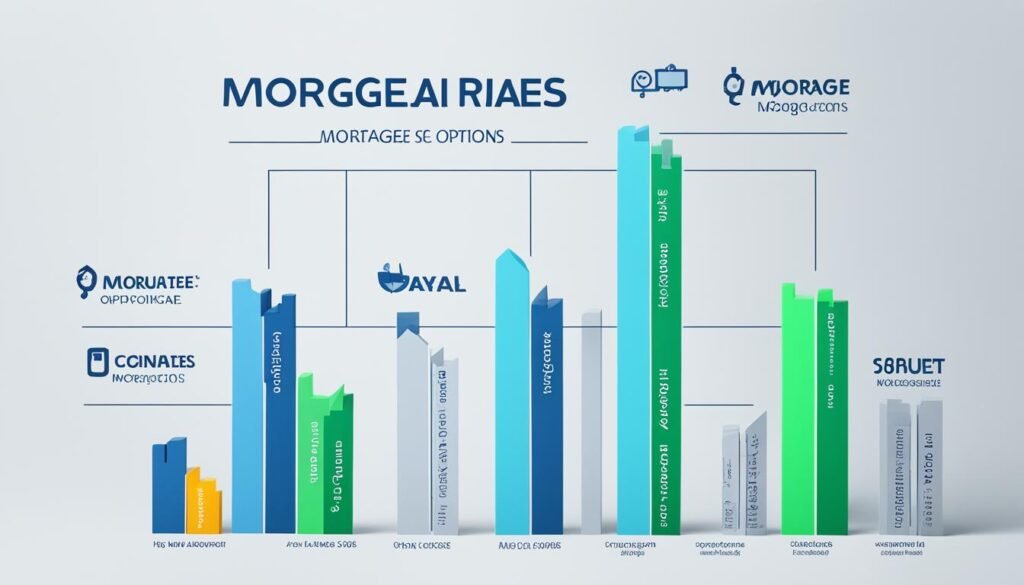Embarking on the journey of financing a house in Israel can be filled with complexities. Yet, understanding the fundamentals of Israel property investment financing is the first step towards making a sound decision. With a unique landscape that differentiates from other countries, real estate loans in Israel come with specific considerations such as higher purchase tax for foreign residents, restrictive mortgage caps, and essential service fees, each pivotal to shaping your financial strategy.
Whether you’re exploring property financing options in Israel or seeking to collaborate with top Israel property finance companies, it’s essential to note that the mortgages in Israel covering up to 50% of a property’s value are typically granted to foreign residents, while the Israelis have exemptions and reductions under specific scenarios1. Truth be told, the intricacies of buying property in Israel finance demand not only attention but a partner who can navigate you through the bustling world of mortgaging for Israel property.
Key Takeaways
- Understand the purchase tax differences between foreign and Israeli residents when financing property in Israel1.
- Grasp the mortgage value limits for foreign residents within Israel real estate financing1.
- Acknowledge the range of realtor and lawyer fees involved in buying property in Israel1.
- Recognize the financial incentives available to new immigrants (olim) regarding purchase taxes1.
- Learn about the tax exemptions offered to Israeli residents on their property purchases1.
Intricacies of the Israeli Mortgage System
Understanding the inner workings of the Israeli mortgage system is a pivotal step for any prospective borrower. With its unique configuration, it’s essential for buyers to become familiar with local terms like Tamhil and to acknowledge the loan structure Israel demands, such as repayment age restrictions. The
Understanding Tamhil
The concept of Tamhil plays a central role within the Israeli mortgage framework. It refers to an arrangement where the mortgage in Israel is subdivided into multiple smaller loans, each carrying distinct interest rates and terms. These diversified loan segments might include fixed-rate loans, variable rates, and even foreign currency-indexed loans. For homeowners and investors alike, grasping the mechanics of Tamhil is crucial to effectively navigate through the intricacies of property financing in Israel.
Loan Structure and Repayment Age Restrictions
Another significant aspect of the Israeli mortgage system is its distinctive loan structure, coupled with defined repayment age restrictions. Typically, local regulations necessitate the complete repayment of a mortgage by the time the borrower reaches the age of 80 to 85. This requirement underscores the need for meticulous financial planning to ensure compliance with the Israeli mortgage system.
| Loan Type | Features | Repayment Period |
|---|---|---|
| Fixed-Rate Mortgage | Predetermined interest rate for the duration of the loan | Up to 30 years, with age restrictions |
| Variable-Rate Mortgage | Interest rate fluctuates based on market conditions | Up to 30 years, adjustable with market rates |
| Foreign Currency-Indexed Loans | Loan linked to a foreign currency exchange rate | Varying terms subject to currency rate adjustments |
While navigating these complexities, it remains imperative for potential buyers to not only understand these features but also to plan strategically within the Israeli mortgage system’s constraints. Whether it comes down to managing Tamhil intricacies, or complying with loan structure Israel maintains, thorough preparation will provide a secure path to property ownership within this unique market.
Key Considerations When Applying for a Mortgage

Embarking on the journey of applying for a mortgage in Israel necessitates a strategic approach. With a myriad of factors to ponder, from loan amount restrictions to requisite documentation for mortgage, aspiring homeowners must navigate the path with due diligence and a grasp of the latest market trends.
Documentation Required
To commence, your application must be accompanied by comprehensive documentation. This typically encompasses a meticulously filled mortgage application form, valid identification documents, current bank statements, a credit score report, and proof of income. These documents serve as the bedrock of your application, effectively communicating your financial history and stability to potential lenders.
Navigating Loan Amount Restrictions
Understanding the nuances of loan amount restrictions in Israel is crucial. While local residents eyeing their sole property can access up to a 75% loan-to-value ratio, non-residents face a cap of 50%. Moreover, lenders will scrutinize your debt-to-income ratio to gauge your borrowing potential, ensuring loans are granted within responsible lending parameters.
Israel’s dynamic credit landscape is reflected in the robust local non-bank credit market, which as of March 2023, flaunts approximately NIS282 billion in corporate bonds and about NIS100 billion in institutional loans2. In this ever-evolving domain, knowledge of legal documentation for financing in Israel, influenced by the Insolvency and Economic Rehabilitation Law effective from 15 September 2019, is indispensable2.
| Loan Type | Max Interest Rate (Per Annum) | Arrears Interest Rate (Per Annum) |
|---|---|---|
| Indexed New Israeli Shekel | 13% | 17% |
| Unindexed New Israeli Shekel | Bank of Israel Rate + 15% | Bank of Israel Rate + 18% |
| Foreign Currency | LIBOR + 15% | LIBOR + 18% |
Moreover, those targeting loans exceeding the NIS1.2 million threshold under the Fair Credit Law must be cognizant of specified interest rates for both new Israeli shekel and foreign currency loans2. Additionally, the market flexibility is exemplified by the absence of currency controls with non-sanctioned jurisdictions and a withholding tax on interest payments set at 23% for corporate lenders, a critical fiscal factor for cross-border financial activities2.
Lastly, the blossoming alternative credit market, particularly active in the realm of mortgages, car loans, and general-purpose loans, underscores the vitality of Israel’s financial sector, deepening the pool of options for borrowers2. When venturing into this terrain, it is essential to align yourself with the current legal and financial parameters shaping the mortgage landscape in Israel, bolstering your chances for a successful and compliant loan acquisition.
Financing Property in Israel: Interest Rates and Options
For investors and future homeowners, understanding the landscape of property financing interest rates Israel is quintessential. As the market witnesses a period of high-interest rates expected to persist for the forthcoming year and perhaps longer3, borrowers scrutinizing mortgage options Israel are advised to exercise due diligence. Reports suggest that commercial real estate investors are exhibiting increased caution, aligning their pursuits with a more selective asset selection strategy due to fluctuating transactions3.

The Federal Reserve’s indication of a potential pause in rate hikes — in light of inflation concerns likely reaching their zenith — offers a glimmer of optimism for those digesting the interest rate options Israel warrants3. Nonetheless, the overarching ‘higher-for-longer’ interest rate approach brings forth both challenges and opportunities for real estate deals, possibly curtailing economic expansion3.
While venture activity may be impeded by these factors, the Emerging Trends Barometer for 2024 recorded a significant surge in its buy rating, signaling opportune conditions for acquisitions since 20103.
In light of these dynamics, it is essential to navigate the array of choices prudently. Here is a comparison of prevalent mortgage options available in Israel:
| Interest Rate Option | Description | Advantages | Risks |
|---|---|---|---|
| Prime Interest Rates | Standard variable rates typically following the central bank’s rates. | Favorable during periods of rate reduction. | Unpredictable during economic fluctuations. |
| CPI-Linked Fixed Rates | Rates fixed over a term with adjustments according to the Consumer Price Index. | Stability against inflation. | Risks inherent to longer commitment periods. |
| Foreign Currency Linked Interest | Interest rates tied to foreign currency values. | Potential savings when foreign currencies are stable. | Volatility inherent in foreign exchange markets. |
Moreover, the inclusion of AI and generative AI is set to transform real estate endeavors by refining property search mechanisms, amplifying customer experiences, optimizing due diligence, and mitigating fraud—further delineating the contemporary fabric of mortgage options Israel3. Renters, in particular, are positioned to benefit from an increasing apartment inventory, with over 460,000 new units in the pipeline for 2023, mitigating rent growth3.
To delve deeper into these emerging trends within the real estate industry and comprehend their implications for property financing interest rates, readers are encouraged to explore this insightful analysis. As the financial climate shifts, so too must the strategies of those looking to finance property in Israel.
The Pre-Approval Advantage in Israeli Real Estate
Exploring the path to homeownership in Israel, a pre-approval for a mortgage not only solidifies your financial standing, but also arms you with significant leverage during the property negotiation process. Delving further, the pre-approval Israeli real estate mechanism is an indispensable tool that offers prospective buyers insight into their budgeting constraints and borrowing capacities.
The Role of Ishur Ekroni in Property Financing
The Ishur Ekroni acts as a pivotal anchor within the sphere of Israeli property financing. This general bank approval delineates a buyer’s financial threshold and offers a tactical advantage in the real estate market. With the Ishur Ekroni in hand, the complexities surrounding property financing appraisal Israel become more manageable, providing a comprehensive outline of purchasing capabilities.
The advantages of securing an Ishur Ekroni precede the active property search, bestowing upon the buyer a concise framework for the impending financial commitment. Such strategic preparation is tantamount to ensuring a smooth acquisition process within the dynamic Israeli real estate market.
Impact of Appraisal on Financing
Another cornerstone to consider is the property appraisal, an evaluative step that banks require to ascertain the accurate market value of your potential new home. The role this appraisal plays in the grand scheme of pre-approval Israeli real estate cannot be overstated — it directly influences the loan amount and terms, ultimately shaping the contours of your financing.
| Appraisal Aspect | Significance in Financing |
|---|---|
| Property Market Value | Determines maximum loan quantum |
| Loan-to-Value Ratio | Informs the permissible borrowing limit |
| Risk Assessment | Affects interest rates and terms |
| Economic Trends | Offers a predictive insight into property value fluctuation |
The meticulous appraisal process mirrors the prudence that buyers ought to exhibit, ensuring that one’s investment reposes on solid financial understanding and realistic expectations. It stands as a testament to how integral a thorough property financing appraisal Israel is to the pre-approval journey, laying the groundwork for a successful transition into property ownership.

Whether you are navigating the real estate waters as an experienced investor or a first-time homebuyer, the clarity furnished by pre-approval and the Ishur Ekroni aligns your real estate aspirations with tangible financial parameters, thereby enhancing your capacity to make informed, judicious decisions in the vibrant Israeli property market.
Conclusion
Embarking on the journey of financing property in Israel necessitates a multifaceted understanding of the complex landscape of mortgage in Israel. Our comprehensive guide sheds light on the various facets integral to the process, from the nuances of loan structures to the pivotal guidelines governing repayment age. These insights equip prospective buyers with the clarity needed to strategically approach the often intricate final thoughts mortgage process Israel, ensuring not only compliance but also the optimization of financial commitments.
From the inception of the mortgage application, attention to detail in documentation and adherence to loan amount restrictions proves vital. Furthermore, the contemplation of concluding thoughts property financing Israel emphasizes the relevance of interest rates and options that could significantly impact the borrower’s financial trajectory. Statistically speaking, closing costs in Israel, which typically exceed 10% of the property price4, coupled with fluctuations in VAT currently at 17%4 and varied commissions such as the real estate agent’s 2% plus VAT4, highlight the critical nature of considered financial planning.
In recognizing the advantages of pre-approvals and assessing the role of Ishur Ekroni, borrowers can navigate the property seas with greater assurance. It stands to reason that the employment of professional services, such as a mortgage broker, may provide invaluable guidance through this complex terrain. Assimilating the knowledge presented within this guide encourages well-informed decision-making, paving the way to secure optimal financing solutions for your property endeavors in Israel.
FAQ
What is Tamhil in the Israeli mortgage system?
Are there loan structure requirements in Israel?
What documentation is required when applying for a mortgage in Israel?
How do loan amount restrictions work in Israel?
What interest rate options are available for financing property in Israel?
What are the advantages of obtaining pre-approval for a mortgage in Israeli real estate?
What is the role of Ishur Ekroni in property financing?
How does property appraisal impact financing in Israel?
What should I consider when financing property in Israel?
Source Links
- https://www.haaretz.com/haaretz-labels/2021-07-22/ty-article-labels/a-guide-to-foreign-residents-flocking-to-israels-real-estate-market/00000180-8db7-df2b-af95-9dbfb98b0000
- https://practiceguides.chambers.com/practice-guides/banking-finance-2023/israel
- https://www.pwc.com/us/en/industries/financial-services/asset-wealth-management/real-estate/emerging-trends-in-real-estate.html
- https://www.jpost.com/jerusalem-report/article-719554

Comments